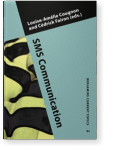Josie Bernicot
List of John Benjamins publications for which Josie Bernicot plays a role.
2018 Chapter 13. Texting by 12-year-olds: Features shared with spoken language Sources of Variation in First Language Acquisition: Languages, contexts, and learners, Hickmann, Maya †, Edy Veneziano and Harriet Jisa (eds.), pp. 265–284 | Chapter
The objective of this chapter is to investigate the development and use of the texting register. Our hypothesis is that this language register shares features with spoken language. In contrast to traditional writing, texting language is not the result of explicit academic instruction. Rather, it is… read more
2018 Chapter 19. Spoken and written narratives from French- and English-speaking children with Language Impairment\ Sources of Variation in First Language Acquisition: Languages, contexts, and learners, Hickmann, Maya †, Edy Veneziano and Harriet Jisa (eds.), pp. 409–426 | Chapter
Children with Language Impairment (LI) show significant delays in spoken language development with persistent problems in morphology. In this chapter, we compare spoken and written narratives from children with LI and their typically developing peers (TD) in French and English. We investigate the… read more
2014 SMS experience and textisms in young adolescents: Presentation of a longitudinally collected corpus SMS Communication: A linguistic approach, Cougnon, Louise-Amélie and Cédrick Fairon (eds.), pp. 29–45 | Article
The aim of this paper was to study the characteristics of SMSes in a population for which there is currently only limited data: young adolescents (girls and boys) between 11 and 12 years of age. The analysis focused on a corpus of 4,524 SMSes sent by 19 informants in everyday real-life situations… read more
2012 SMS experience and textisms in young adolescents: Presentation of a longitudinally collected corpus SMS Communication: A linguistic approach, Cougnon, Louise-Amélie and Cédrick Fairon (eds.), pp. 181–198 | Article
The aim of this paper was to study the characteristics of SMSes in a population for which there is currently only limited data: young adolescents (girls and boys) between 11 and 12 years of age. The analysis focused on a corpus of 4,524 SMSes sent by 19 informants in everyday real-life situations… read more
2002 “Tu es dans la lune” : Understanding idioms in French-speaking children and adults Pragmatics 12:4, pp. 399–413 | Article
From a psychological point of view, this study looks at children’s and adult’s comprehension of idiomatic expressions, and most particularly at the underlying cognitive processes needed for comprehension. Idiomatic expressions are expressions where there is a considerable difference between what… read more



